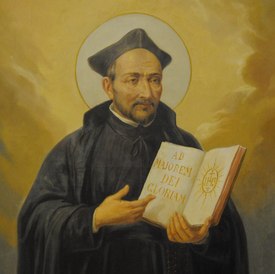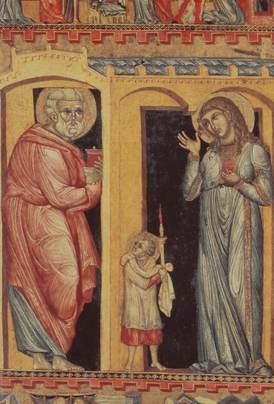Spiritual Life: February 2010 Archives
I went to confession the other day. I try to go once a month and for the most part I make that commitment. For some reason, it was a about 8 weeks since I darkened the confessional. I was leaving that afternoon for my hermitage day (spoken of in another blog post below) and Lent was fast approaching. Going to confession was awkward, lonely, fearful BUT intensely gratifying, freeing, and loving. Facing one's sinful nature is NEVER easy; it is NEVER anything but a hassle, it is NEVER anything but embarassing but it is the only way I know how to be honest with myself in front of God. As an Opus Dei priest tells me when I see him occasionally for confession: you've got sin, I've got the grace for you to live ... by the ministry of the Church. Of course, this priest is echoing the notion that I am not confessing my sinful self to him personally (I really don't think he cares one-way-or-another truely in the best sense) but ipse Christus --to Christ Himself. I read the passage noted below from a rather famous spiritual treatise today and the last line from sacred Scripture struck me: If anyone would come after me, let him deny himself. Do you have a clear understanding of mortal sin? Have you gone to confession? How is your struggle with sin going in the face of grace?
Only mortal sin is completely opposed to God; this opposition is so great that it separates the soul from God. However, every sin, even venial sin, and every fault and imperfection, is in opposition to God's infinite holiness. Therefore Jesus offers the perfection of his heavenly Father as a norm for our Christian life, and engages us in an intense struggle against sin in order to destroy in us its deepest roots and even its slightest traces.
This is what Jesus teaches in these few short words: deny yourself. We must deny self with all its imperfect habits and inclinations; and we must do so continually. Such a task is fatiguing and painful, but it is indispensable if we wish to attain sanctity. Jesus says: The gate is narrow and the way is hard that leads to life, and those who find it are few (Mt.
In echo of Jesus, all the masters of the spiritual life insist strongly on detachment and self-renunciation as the indispensable foundation of the spiritual life.
But first and foremost, it is Jesus, the divine Teacher, who has pointed out to us the absolute necessity of passing through this way: If anyone would come after me, let him deny himself (Mt.
Divine Intimacy
I came across this entry in an old encyclopedia. In its brevity a lot of truth is revealed: we can work (asceticism) by reason, and the heart, to union with God. Consider for a second what the author, Fr Drum, has to teach. Also, remember that Ignatian spirituality is not the same as Jesuit spirituality. The two are not the same by any stretch of the imagination. Fr Drum tells us that it is possible through prayer and good spiritual direction to know, love and serve God in this world so as to do the same in the next. Many people today don't have the confidence that knowing and loving and serving God is possible at all. Some don't know that God wants our happiness today --in this life--that there is meaning to our life that includes suffering and love (& joy) and some reject the notion that we are oriented toward a final goal. Christians call this goal heaven, the Beatific vision, communion with the Trinity, etc. What else is there for the Christian who really prays and lives his or her life with the Gospel and with reason? I get the sense that they don't have the certainty that God knows us personally and intimately, never mind having a relationship with bodiless being.
I spent many years being formed by Ignatian Spirituality. My personal, cultural, ecclesial life (taken as a unity) is informed by what Saint Ignatius of Loyola proposed in his Spiritual Exercises. But I would not be telling the whole truth if I didn't say that other influences have had a strong influence in how I look at my life and life's work today. My life intersects with Msgr. Luigi Giussani, Saint Josemaria Escriva, Saints Francis & Dominic and Saint Benedict. The host of women saints and blesseds are too cumbersome to note here. The point, however, is not my interpretative lens except to say that I have benefited from the Spiritual Exercises and perhaps you might think the same if you gave the Exercises a chance. They are clearly an apostolic method in the spiritual life with an incredibly strong contemplative aspect. The Exercises are not for everyone, so be patient with them if you attempt to do an Ignatian retreat.
Ultimately, what the author of this entry names as the goal of the Christian life is my own, regardless of the influences: To live is Christ. It is entirely consistent with the motto of my coat of arms seen above: sequela Christi (to follow Christ). Ignatius (and the other spiritual masters noted above) could not conceive of life any differently. Would that be the same for all people!
The entry:

The spirit of Saint Ignatius was Pauline, -- intrepid yet tender; motivated by two great principles,--love of Jesus Christ and zeal for the salvation of souls. These two principles were brought together in his motto: A. M. D. G., "Omnia ad Majorem Dei Gloriam" (All for the greater glory of God). It was this spirit, which breathed in "The Spiritual Exercises," a method of asceticism, that is the very soul of the constitutions and activities of the Society of Jesus.
This little book is said to have converted more souls than it contains letters.
Certainly the results it has produced down the centuries cannot be exaggerated. The importance of its method is proved by the mere fact that 292 Jesuit writers have commented on the whole work. The purpose of the Exercises is definite and scientific upbuilding of the reason, will and emotions, by meditation and contemplation on the fundamental principles of the spiritual life and by other exercises of the soul. First, God is rated rightly as the soul's end and object.
Reason is convinced that God is the end for which the soul is created, and all things else are only means to bring the soul to God; hence it follows that that is good which leads the soul Godward, and that is evil which leads the soul awayward from God.
The soul's awaywardness from God results in sin; so sin is studied both in itself and in its consequences to the soul. Secondly, Jesus Christ is put in His place in the soul, by meditations on His ideals and contemplations on His private and public life.
The soul now aspires to the very height of enthusiastic and personal love to Him; and to the most self-sacrificing generosity in following the evangelical counsels.
Thirdly, the high resolves of the soul are confirmed by the imitation of Christ in His passion. Lastly, the soul rises to a sublime and unselfish joy, purely because of the glory of its risen Lord; and leaps with rapturous exultation into the realms of unselfish and perfect love of God, such as Saint Paul evinced when he cried out: "To me, to live is Christ; to die were gain" (Philippians 1, 21).
Fr Walter Drum, SJ
The Encyclopedia Americana, 1919
Prayer to Saint Agatha

O glorious Saint Agatha, through whose intercession in Christ I hope for the restored health of body and soul hasten to lead me to the true Good, God alone. By your intercession O blessed Agatha, may I ever enjoy your protection by faithfully witnessing to Christ. You invite all who come to you to enjoy the treasure of communion with the Holy Trinity. Moreover, if it be for God's greater glory and the good of my person, please intercede for me with the request of [mention request here].
Saint Agatha, you found favor with God by your chastity and by your courage in suffering death for the gospel. Teach me how to suffer with cheerfulness, uniting myself to Christ crucified with a simplicity and purity of heart. Amen.
Saint Agatha, eloquent witness of Jesus Christ as Savior, pray for us.
Saint Agatha, the martyr who says to Jesus, "possess all that I am," pray for us.
Saint Agatha, concerned with the welfare of all God's children, pray for us.
Saint Agatha, pray for us.
The Church observes the liturgical memorial of Saint
Agatha on February 5th each year by offering the Sacrifice of the Mass and the
Divine Office with the Sacrament of Anointing of the Sick for those living with
diseases of the breast. The imprimatur for this prayer is given by Henry
J. Mansell, Archbishop of Hartford, 2007. Copyright © Paul A. Zalonski.

